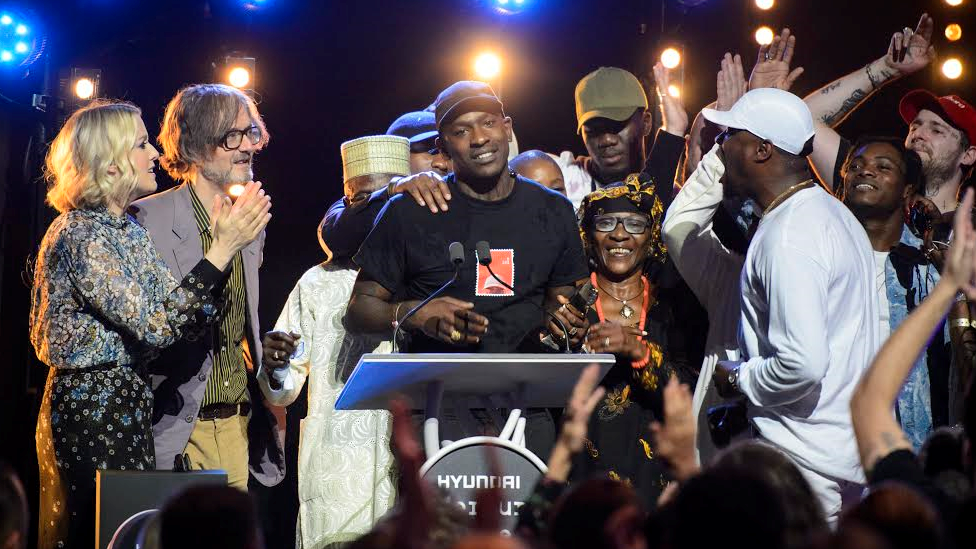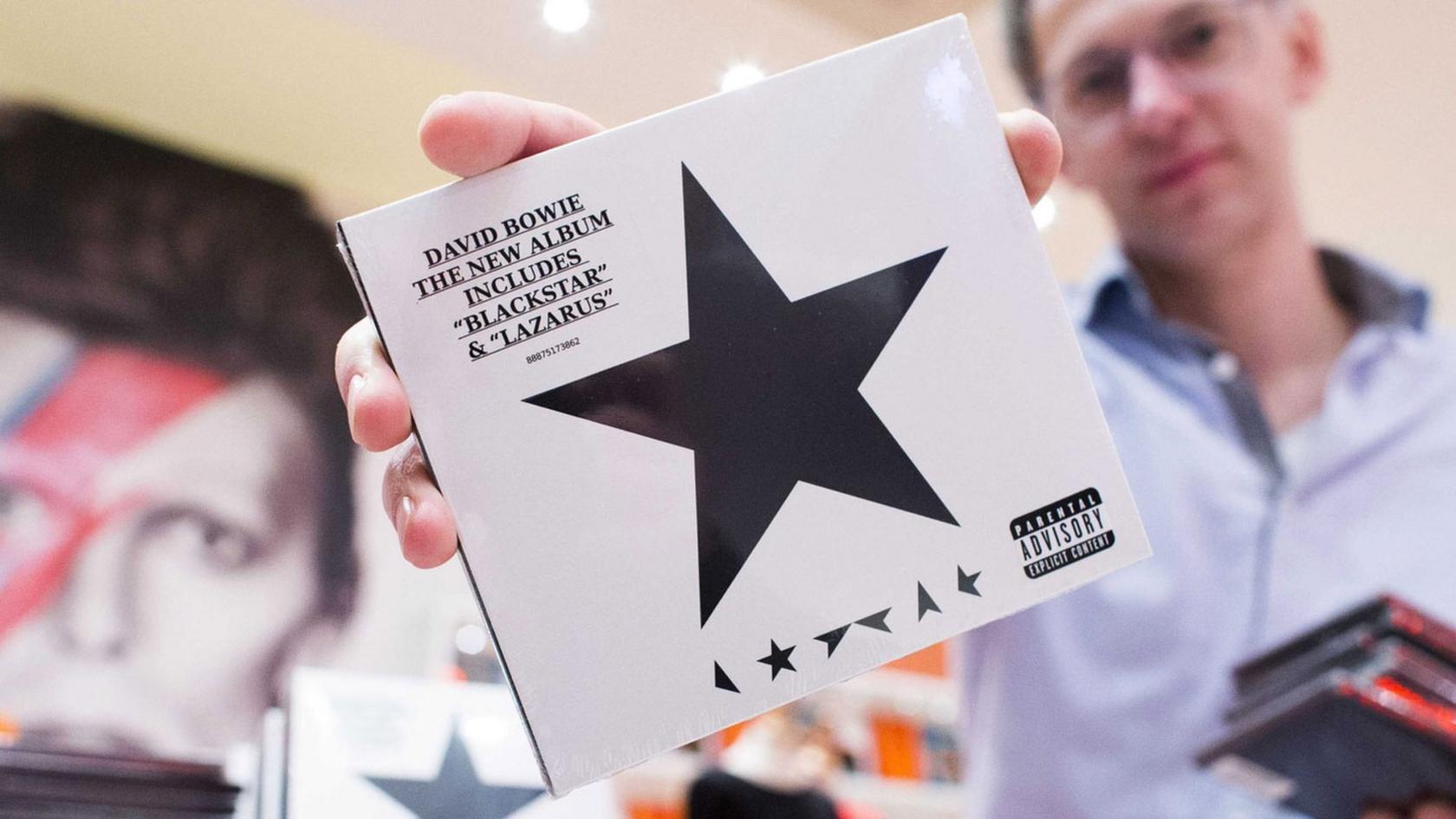Skepta: Seven things you should know about the 2016 Mercury Prize winner
- Published

Skepta has been making music since the early 2000s
Grime MC Skepta has won the Mercury Prize with Konnichiwa, an album he produced and released by himself. Here are seven things you should know about the London-based artist.
1) He's a firestarter
Skepta was born Joseph "Junior" Adenuga in September 1982 to immigrant parents from Nigeria.
The family moved to Tottenham's Meridian Estate in north London, after the then three-year-old burnt down their house by accidentally setting a teddy bear on fire.
2) Family is all-important
After settling in Tottenham, Joseph became Skepta (a variation on the word "sceptre") and began making music with his brother Jamie, now better known as Grime producer JME. His sister Julie Adenuga also works in music - presenting a show on Apple's Beats 1 Radio.
He keeps his family close - rapping about his mother ("See me on the TV, hi mum!") and tweeting that he misses them when he's on tour. Earlier this year, the musician helped to build a playground in his dad's home village, external.
Unsurprisingly, then, Skepta brought his parents up on stage when he won the Mercury Prize, dedicating his award to them and "all the mums and dads - because they made us, they gave us that voice in our head that's talking to keep us in line, to keep us in check."

Skepta's mother can be seen on his left (and his father just behind his right shoulder) in this Mercury Prize photo
3) Konnichiwa reignites the concept of protest songs
"We don't listen to no politician," raps Skepta on Shutdown, the sparse, incendiary track he performed at the Mercury Prize ceremony.
"For a long time, I've never really understood what they do for us, or what they do for anybody," the rapper told the BBC.
It's one of many lines aimed at authority, reaching a pinnacle on Crime Riddim, which depicts the experience of spending a night in the cells after being stopped and searched by the police.
"The feds wanna shift man / Wanna put me in a van / Wanna strip a man / I ain't a Chippendale / Wanna strip a male / Put me in a prison cell / Got me biting on my finger nails."
4) He has no time for the music industry
When Time Out turned up to interview Skepta at his house earlier this year, external, they found it was literally being used as a warehouse, with boxes of CDs piled from floor to ceiling.
It's a perfect illustration of the rapper's DIY ethos. His album was recorded in his bedroom and marketed to fans directly online, without all the apparatus of the modern music industry.
And, as someone who has found himself straitjacketed by a major label in the past, he wants his fellow musicians to know they can seize control of their own destinies.
"The internet's given a lot of opportunities to people who are not built for big corporations," he told the BBC. "It allows you to speak to fans directly. To make things from your bedroom and give it to them.
"I want to inspire people that make other genres of music to think, 'Why am I with this record label? They tell me what to do and I don't feel like myself any more. So I'm getting out. I'm getting out because of Skepta. Skepta did it.'"
"I want to get that into people's heads. This is real. I'm not signed. I'm independent. DIY is the future."
5) Adele changed his life
At his lowest ebb, after being dropped by his label and facing up to the death of a close friend, Skepta was ready to give up on music. Then fate, and the biggest-selling artist in the world, intervened.
"One day I was just chilling and Adele posted up a picture of me [on Twitter] that said 'Tottenham boy'," he said.
"I was going to quit... I was going to quit music that day. But that was one of the sickest things that could have happened.

Adele - changing the course of music history, not for the first time
"I love Adele," he continued. "She's another artist I watch, I watch how she moves.
"She tells us how to treat her, she tells us: 'Don't run after me, don't pap me, don't follow me... I'm just this, I perform here, thank you guys, let's be blessed.'"
6) Don't ask him about the "resurgence of grime"
"'People who think grime is back are sheep that follow the media," said the star in a recent interview. "People who aren't sheep know grime never went away."
Backstage at the Mercury Prize, he even denied that Konnichiwa should be categorised as grime.
"I wouldn't say it's a grime record. It's a really good time for grime but I think this is a revolution in freedom."
Which brings us neatly to our final point...
7) His message is freedom
His lyrics occasionally get political, but what Skepta really wants is for people to shed their preconceptions of the world around them.
"I've grown up in this society and realised [that for] everything I was worried about, from the government to money, I was putting stress on myself. A lot of self-inflicted pain.
"Once I told myself, I don't want money and I don't want to be on the telly, and I don't really want an award, I found myself. I was able to be very true and be free.
"It's a message I think is important for the kids to know. You don't need to listen to anyone else. You need to find yourself."

Follow us on Twitter @BBCNewsEnts, external, on Instagram at bbcnewsents, external, or if you have a story suggestion email entertainment.news@bbc.co.uk, external.

- Published16 September 2016

- Published12 September 2016

- Published11 January 2016

- Published4 August 2016

- Published25 July 2016

- Published4 August 2016
- Published4 August 2016
